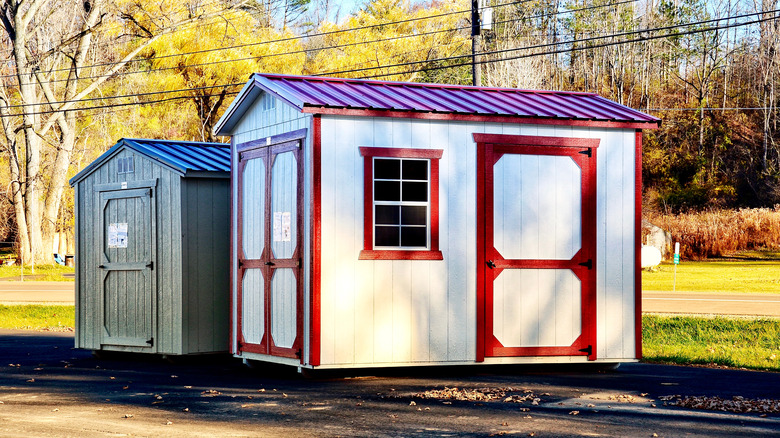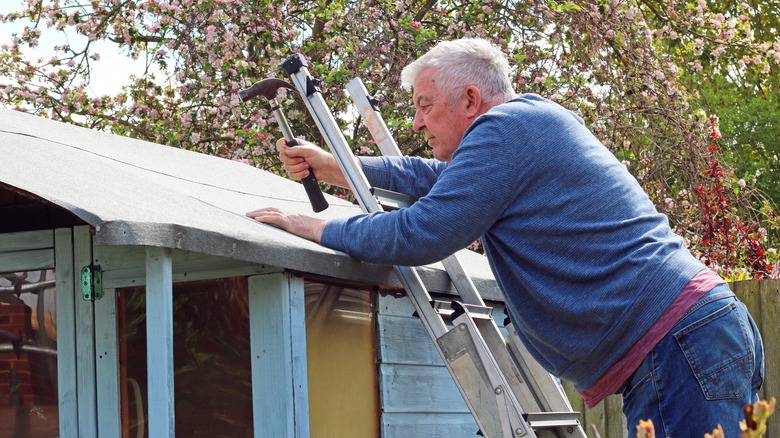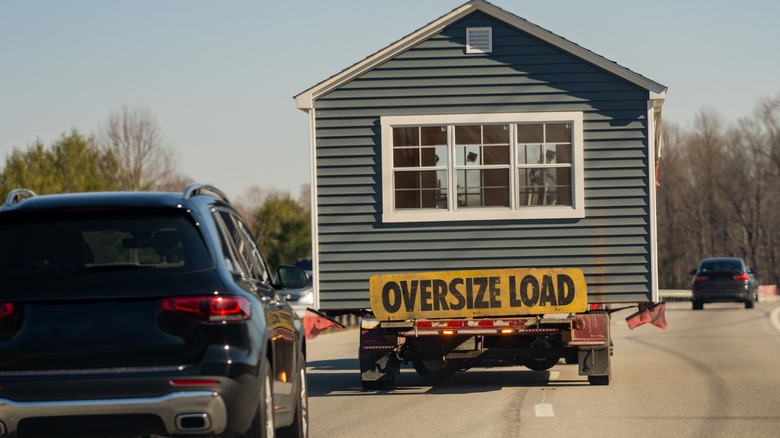Don't Buy A Used Storage Shed Without Considering These Major Disadvantages
When you find a used storage shed at an unbeatable price from somewhere that isn't Lowes or Home Depot, it's easy to picture all the cool things you could do after you bring it home — from organizing your tools to creating that elevated man-cave or she-shed for relaxation or maybe even that place to do all those DIY projects you've been letting pile up. So you get the win-win of space while saving money, and that is always good, right?
But hold up just a minute. Before you rush into making a purchase that seems too good to pass up, it is important that you take a step back and wonder why the price is so low and what kind of potential downfalls you could be facing further down the line. The simple truth is that buying a used shed may not always be the straightforward solution it appears to be, and numerous factors can complicate your decision, including the absence of warranties that leave you unprotected against defects, a lack of customization options to make the shed your own, the challenges associated with relocating it without damage, and the risk of hidden structural issues. These disadvantages can turn your promising find into a stressful and costly blunder and have you wondering why you ever thought this was a good idea in the first place.
What are some disadvantages to buying a used shed?
First up, let's chat about warranties — or the lack thereof. When you buy a used storage shed, you're pretty much saying bye-bye to any protection you might have enjoyed with a purchase straight from the store or manufacturer. Imagine discovering a leaky roof or faulty door hinges shortly after setting up your new-to-you shed. Now, all of a sudden, that bargain buy isn't looking so budget-friendly.
Warranty peace of mind is a significant benefit when buying new. It offers a safety net against unexpected repairs and ensures any craftsmanship issues are addressed without draining your bank account. Without this safeguard, a used shed becomes a potential money pit, ready to suck up your savings at the slightest hint of trouble. It's a gamble, and just like in Vegas, the house (or, in this case, the shed) might win.
Then there's the issue of customization — or rather, the lack of it. Your shed itself might be cheaper, but what if you wanted to turn your shed into a tiny home, which could involve adding new windows, building up new walls, or needing more space in one particular area? With a used shed, the options for personalization are slim to none. You're stuck with what you get, and any attempt to retrofit the shed with your dream features might end up costing more than the shed itself.
Are there even more cons to buying used storage sheds?
Now, let's talk about moving day. Unfortunately, relocating a used shed is not as simple as hitching it to a truck and calling it a day, and you might find yourself in a bind trying to locate a professional willing to take on the task. Even if you do find one, it won't come cheap. Plus, depending on where you live, you might need to deal with permits or zoning regulations, adding another layer of hassle to your shed saga. Not to mention that if your shed is in less-than-perfect condition, the relocation process could cause further damage.
That leads us to the wild card — hidden damage. The shed might look perfectly fine at first glance, but lurking beneath its exterior could be a host of issues like mold, rot, or structural weaknesses. Since many people looking to save money on a used shed might skip a professional inspection, these problems often go unnoticed until they're impossible to ignore.
In the end, while the idea of snagging a used storage shed at a bargain price can be tempting, it's important that you sit down and really weigh out all these potential pitfalls. From the absence of warranties and limited customization to relocation issues and hidden damage, buying used can be tricky. But, if you're still determined to go the used route, do your homework, ask questions, and if possible, get a professional opinion!


